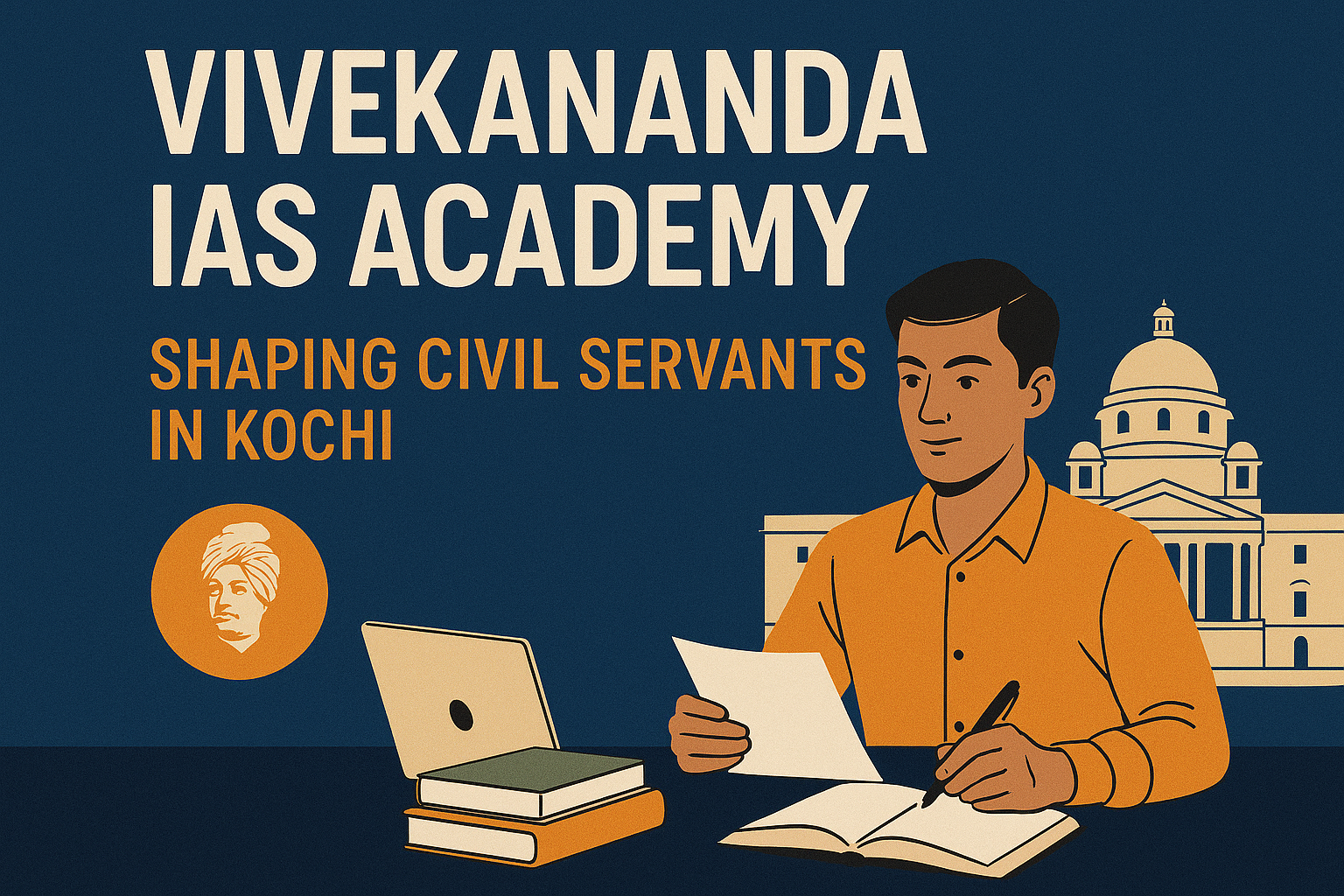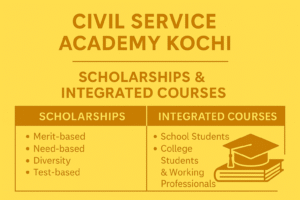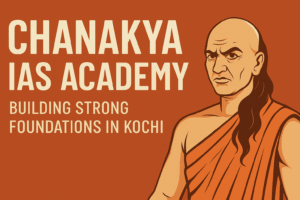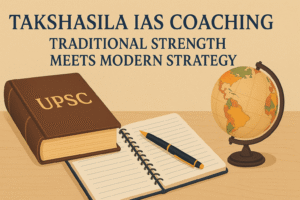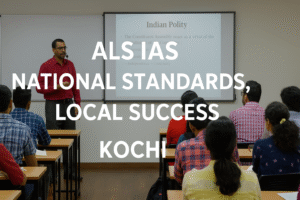Why Kochi & Why Vivekananda IAS Academy?
Kochi has rapidly evolved into a Southern hub for UPSC CSE preparation—accessible faculty, a thriving student community, and a balanced cost of living. Vivekananda IAS Academy positions itself as a student-centric institute that brings structured pedagogy, disciplined mentoring, and Kerala-aware content to the UPSC journey.
Key promises at a glance
Structured Prelims → Mains → Personality Test pipeline
Consistent test series with analytics & remedial plans
Mentor hours for answer-writing, doubt clearing & plan corrections
Current affairs lab: issue briefs, PIB/RSTV/PRS capsules & editorials
Ethics & Essay workshops with real case-study drills
Interview bootcamps with DAF mining & mock panels
Classroom + digital learning support for working professionals
Courses & Pathways
1) Prelims Foundation (GS + CSAT)
NCERT to advanced coverage; objective drill sets
Weekly mini-tests + monthly GS full-length tests
CSAT skill labs (logic, DI, RC) for non-math backgrounds
2) Mains Advanced (GS I–IV + Essay)
Theme-wise coverage with syllabus-keyed notes
Daily Answer Writing (DAW) with structured feedback (Intro–Body–Way-Forward)
Ethics casebook: stakeholder mapping, ethical frameworks & real incidents
3) Integrated (Prelims-cum-Mains)
Single timetable with overlap strategy to avoid duplication
Revision sprints before both Prelims and Mains
Personalized study-plan pivots every 4–6 weeks
4) Optional Subject Mentoring
Foundation, enrichment classes & test series with model answers
Focus on building source sheets (books, reports, committees, journals)
Check the latest optional subjects offered and schedules directly with the academy.
5) Test Series (Prelims & Mains)
UPSC-like difficulty, progressive sets, and mixed-topic mocks
Performance analytics: accuracy vs. speed, topic heat-maps, rank sheets
Remedial classes triggered by common error clusters
6) Interview Guidance (Personality Test)
DAF decoding, panel simulations, stress & situational rounds
Kerala and national current-affairs issue briefs for structured opinions
Communication drills: tone, structure, and time discipline
Teaching & Mentorship Model
Pedagogy pillars
Syllabus discipline: Every class mapped to a line of the UPSC syllabus.
Source economy: Limited, high-yield booklist + selective digital resources.
Revision rhythm: Weekly recalls, monthly consolidations, and pre-exam sprints.
Practice first: DAW, case studies, PYQs integrated from Week 1.
Feedback loop: Written & one-to-one spoken feedback on tests and answers.
Mentor support
Starter call to fix baselines and a realistic 9–12 month plan
Checkpoint reviews (fortnightly/monthly) to correct drift
Escalation channel before critical mocks and board interviews
Current Affairs, Essay & Ethics—The Academy Edge
Current Affairs Engine
Daily briefs (PIB, editorials, PRS) → Weekly issue dossiers → Monthly compendium
Value-addition nuggets: schemes, data points, committee reports, SDGs
Essay Workshops
Theme deconstruction → skeleton building → paragraph flow
Practice across philosophical, societal, science-tech, governance themes
Evidence bank: anecdotes, constitutional ideals, quotes & data
Ethics (GS-IV)
Applied frameworks (utilitarianism, deontology, virtue ethics, stewardship)
Kerala-context caselets (disaster response, local governance, social justice)
Practical answer templates for sub-parts (a) & case studies (b)
Study Plans & Schedules
For first-time aspirants (12-month track)
Months 1–3: NCERT consolidation + GS basics + CSAT routine
Months 4–6: Standard books + DAW start + Prelims mini-tests
Months 7–9: Mains depth + Essay/Ethics + mixed mocks
Months 10–12: Prelims sprint → after Prelims: Mains sprint & full-lengths
For working professionals
Hybrid mode with weekend long sessions + weekday micro-tasks
Micro-cycles (90-minute blocks) and buffer weeks before mocks
Learning Resources & Support
Handwritten-style concept notes and clean one-pagers for last-mile revision
PYQ labs (10 years) to train pattern recognition and demand reading
Doubt engine: forum + mentor hours + class-specific chats
Performance dashboard for test history and improvement arcs
How to Choose Your Batch (Quick Checklist)
Faculty depth & continuity across the year
Test series post-test analysis quality (not just question papers)
Proof of answer-checking rigor (sample copies, rubric)
Realistic planner with buffers and revision windows
Availability of mentor hours and DAF-focused interview guidance
Admissions & Scholarships (Indicative)
Admissions: typically via counselling + diagnostic test (where applicable)
Scholarships: merit/minority/need-based or test-linked (varies by cycle)
Modes: Classroom (Kochi) + live/recorded digital learning
For current batch start dates, scholarships, and seat availability, contact the academy directly.
Frequently Asked Questions (FAQ)
1) Is Vivekananda IAS Academy suitable for beginners?
Yes. The foundation track starts from NCERT basics, gradually layering advanced GS and answer-writing.
2) Can working professionals manage the schedule?
The academy provides hybrid options, recorded backups, and weekend-heavy plans tailored for full-time employees.
3) How important is the test series?
Crucial. It builds question sense, coverage discipline, and time management. Look for analytics, feedback depth, and remedial classes.
4) Does the academy provide support for Optional subjects?
Optional mentoring is typically available; confirm the current list and cycle before enrolling.
5) How are current affairs handled?
Through daily briefs, weekly dossiers, and monthly compilations integrated into both Prelims and Mains answer practice.
6) What should I check before joining a batch?
Faculty credentials, test-review quality, mentor access, realistic timelines, and availability of interview guidance.
7) Is there interview (Personality Test) preparation?
Yes—DAF analysis, panel mocks, and structured feedback with issue-based discussions.
8) What is the ideal preparation duration?
Most first-time aspirants take 10–14 months; repeaters often aim for 6–9 months with a test-heavy plan.
9) Which books should I start with?
Start with NCERTs (Class 6–12 selectively) + one standard book per subject; avoid booklist sprawl and follow the academy’s curated list.
10) Can I switch batches mid-course?
Policies vary by cycle. Confirm transfer, recording access, and continuity of mentorship before switching.

